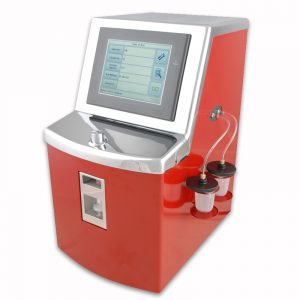FAME In Jet Instrument (FIJI) SA5000-2, the solution 
The patented FIJI > offers a rapid and easy check on parts per million (ppm or mg/kg) levels of unconverted esters and fatty acids in aviation fuel.
FIJI is robust, extremely simple to use and fully automatic with no specialist operator training required. Each test requires less than 50 ml of sample and takes approximately 15 minutes. Results are presented in mg/kg units and an optional traffic light system indicates FAME contamination levels of the fuel.
FIJI is the only mandated test for refineries who are co-processing fuel, as per ASTM D1655 > Annex A1.2.2.4 (1):
The extent of conversion shall be assessed via D7797/IP 583. In addition to the Table A1.1 limit on the finished product, the preferred methodology for assessing conversion is comparison of D7797/IP 583 results between process unit rundown jet line samples prior to and during co-processing.
FIJI is the only rapid test that can screen for all types of FAME.
Learn more about the FIJI SA5000-2 >
ASTM D1655 (Standard Specification for Aviation Turbine Fuels)
ASTM D1655 includes ASTM D7797/IP 583 (FIJI) as a mandated test for all refineries who are co-processing fuel as well as those who are re-testing, re-blending or re-certifying Jet fuel. This is to verify that aviation fuel production has not exceeded the permitted level of 15 mg/kg unconverted esters and fatty acids.
Co-processing involves the blending of both crude oil derived distillates and bio based feedstocks, giving a high potential for bio products to comingle with other fuels being refined or distributed by  shipment or pipeline.
shipment or pipeline.
The greatest concern is the potential for these co-processed products to become mixed with aviation fuel. Therefore, stringent maximum specified bio limits need to be maintained to ensure fuel quality and safety is not compromised.
What is co-processing?
Co-processing is the use of bio feedstock materials as a source of energy to supplement the amount of petroleum based feedstocks used for fuels, reducing the use of conventional fossil fuels.
It is a proven sustainable development concept that reduces demands on natural resources. It helps to reduce pollution and landfill space, contributing to reducing environmental footprint.
To help meet renewable fuel targets, refiners are able to co-process fatty acids/esters with middle distillates.
Learn more about the FIJI SA5000-2 >